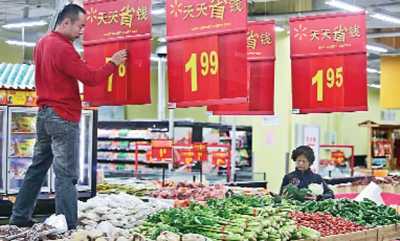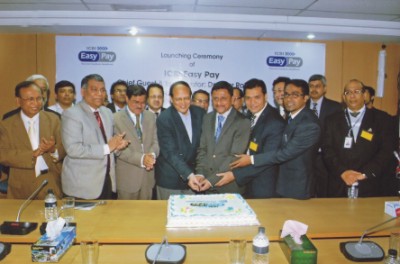Banking
AB Bank opens free Saturday Clinic

A customer selects vegetables as an employee changes a price label at a supermarket in Wuhan, Hubei province on Friday. China’s annual inflation rate tumbled in November to 4.2 percent, the lowest level in more than a year, fuelling expectations of further monetary policy easing to combat deteriorating domestic and international economic conditions.
Source: The Daily Sun/ Bangladesh/ 11th Dec 2011
BBF, City Bank orgainses communication summit
Bangladesh Brand Forum (BBF) and City Bank jointly organised day-long ‘Communica-tion Summit 2011’ at Westin Hotel in Dhaka recently, focusing on the growing importance of communication irrespective of the nature of business.
Heads of marketing, management, accounts, media and creative departments of different corporate, advertising, public relations and media institutions participated in the function, says a press release.
The Summit showcased the best creative work of Cannes Festival 2011, the largest advertising festival in the world. An inclusive panel discussion was also held among the members from both clients and agencies.
Source: The Daily Sun/ Bangladesh/ 11th Dec 2011
China’s Huawei cuts back business in Iran
BEIJING: Chine telecommunications equipment maker Huawei Technologies says it will cut back its business in Iran, where it aids state-run telecom operators, due to the “increasingly complex situation” there.
Iran keeps close tabs on its citizens, aided by imported technology, and faces rising Western sanctions over its nuclear programme and the treatment of its people since the state crushed protests over a contested 2009 vote.
Huawei will “voluntarily restrict its business development” in Iran “by no longer seeking new customers and limiting its business activities with existing customers”, the Shenzhen-based company said on its website.
“For communications networks that have been delivered or are under delivery to customers, Huawei will continue to provide necessary services to ensure communications for Iran’s citizens,” the statement said.
In November, responding to what it called biased reporting, Huawei said that “we have never been involved in and do not provide any services relating to monitoring or filtering technologies anywhere in the world”.
Source: The Daily Star/ Bangladesh/ 11th Dec 2011
India inches closer to crisis as rupee retreats
India may face its worst financial crisis in decades if it fails to stem a slide in the rupee, leaving the Reserve Bank of India (RBI) with a difficult choice over how to make best use of its limited reserves to maintain the confidence of foreign investors.
If the RBI is too timid, it risks adding fuel to the ire of portfolio investors, which India relies on heavily to cover its imports tab.
Aggressive intervention would leave the central bank open to criticism that it is wasting precious money on problems that are beyond India's control anyhow, noteably Europe's debt crisis.
Unlike most of its Asian peers, India has recently been running large current account and fiscal deficits. That means it must attract sufficient foreign money -- namely U.S. dollars -- to close the gap, and a weaker home currency makes that costlier.
This is a perennial problem for India. The current situation is so worrisome because India is grappling with big internal and external economic threats simultaneously. Growth is slowing. Inflation remains high. Political paralysis has stymied domestic reforms.
The RBI, the last line of defence against a currency meltdown, has cautiously begun to support the rupee, but its firepower may be more limited than its $300 billion in reserves would suggest.
Beyond India's borders, Europe is the biggest worry. As its banks deleverage, investment money has flooded out of India's markets. If Europe's debt troubles deteriorate, India could be hit with a balance of payments crisis as severe as the one that forced a sharp devaluation in 1991.
The rupee, which has dropped 16 percent in the past four months, got a reprieve last week after the world's big six central banks banded together to try to ease dollar funding strains, helping it to snap a four-week losing trend.
But analysts widely expect the rupee, trading on Monday at 51.26 per dollar, to resume its slide.
"The Indian currency will be the first casualty of a deterioration in the euro zone crisis," said Rupa Rege Nitsure, chief economist at Bank of Baroda in Mumbai.
If Europe's crisis deepens, India's trade deficit would widen even more rapidly, and it would have even more trouble attracting foreign capital.
"Risk appetite will obviously collapse and gradually the currency crisis is likely to take the shape of a balance of payments crisis," Nitsure said.
Worries about India have spiked in tandem with concern over Europe. UBS hosted a client conference call about India on November 29, which it announced with an email headlined "India explodes." Deutsche Bank sent out a report on November 24 entitled, "India's time of reckoning."
"Suddenly everything seems to be coming to a head in India," UBS wrote. "Growth is disappearing, the rupee is in disarray, and inflation is stuck at near-record levels. Investor sentiment has gone from cautious to outright scared."
India's current account deficit swelled to $14.1 billion in its fiscal first quarter, nearly triple the previous quarter's tally. The full-year gap is expected to be around $54 billion.
Its fiscal deficit hit $58.7 billion in the April-to-October period. The government in February projected a deficit equal to 4.6 percent of gross domestic product for the fiscal year ending in March 2012, although the finance minister said on Friday that it would be difficult to hit that target.
Source: The Daily Star/ Bangladesh/ 11th Dec 2011
Easy Pay service

Atiur Rahman, governor of Bangladesh Bank, cuts a cake at the launch of ICBI Easy Pay service -- an electronic fund transfer system -- of ICB Islamic Bank, at a programme in the capital recently. Mamoon Mahmood Shah, managing director of ICB Islamic Bank, was also present.
Source: The Daily Star/ Bangladesh/ 11th Dec 2011



